

Narrativista o narrativo?GDR Sperimentale. Sono la stessa cosa?
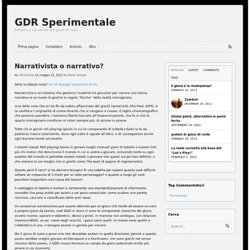
Noi di Voyager pensiamo di no. Narrativista è un sistema che gestisce l’autorità tra giocatori per narrare una storia, narrativo è un modo di gestire le regole “fisiche” della realtà immaginata. Una delle cose che mi ha fin da subito affascinato dei giochi narrativisti (the Pool, AiPS), è la vastità e l’originalità di scene diverse che si vengono a creare, il taglio cinematografico che possono prendere, l’estrema libertà lasciata all’improvvisazione, che fa si che lo spazio immaginario condiviso si colori sempre più, di azione in azione.
Tutto ciò in giochi roll playing (giochi in cui la componente di scheda+dado la fa da padrona) manca totalmente, dove ogni salto è uguale all’altro, e di conseguenza anche ogni burrone tende ad esserlo. Questo però è vero? Questo per quanto riguarda D&D e simili, ma l’alternativa qual’è? Wushuopenita. Open_reloaded. THE POOL: A Role-playing Game by James V. West. Sistema-universale-narrativo-s1. Untitled - The_Sergio_s_pool.pdf. Microsoft Word - THE POOL_ita.rtf - The_pool_ita.pdf. TheItalianPool.pdf. GURPS. Players control their in-game characters verbally and the success of their actions are determined by the skill of their character, the difficulty of the action, and the rolling of dice.
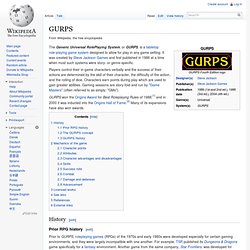
Characters earn points during play which are used to gain greater abilities. Gaming sessions are story-told and run by "Game Masters" (often referred to as simply: "GMs"). GURPS won the Origins Award for Best Roleplaying Rules of 1988,[1] and in 2000 it was inducted into the Origins Hall of Fame.[2] Many of its expansions have also won awards. History[edit] Prior RPG history[edit] The GURPS concept[edit] GURPS' emphasis on its generic aspect has proven to be a successful marketing tactic, as many game series have source engines which can be retrofitted to many styles.[5] Its approach to versatility includes using real world measurements wherever possible ("reality-checking" is an important part of any GURPS book). GURPS history[edit] A free PDF version of the GURPS rules was released as GURPS Lite. Fudge (role-playing game system)
Fudge is a generic role-playing game system for use in freeform role-playing games.[1] The name "FUDGE" was once an acronym for Freeform Universal Donated (later, Do-it-yourself) Gaming Engine[2] and, though the acronym has since been dropped, that phrase remains a good summation of the game's design goals.
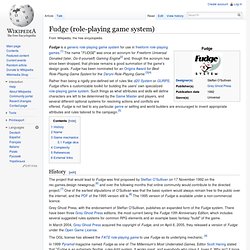
Fudge has been nominated for an Origins Award for Best Role-Playing Game System for the Deryni Role-Playing Game.[3][4] Rather than being a rigidly pre-defined set of rules like d20 System or GURPS, Fudge offers a customizable toolkit for building the users' own specialized role-playing game system. Such things as what attributes and skills will define characters are left to be determined by the Game Master and players, and several different optional systems for resolving actions and conflicts are offered.
Fudge is not tied to any particular genre or setting and world builders are encouraged to invent appropriate attributes and rules tailored to the campaign.[5] TWERPS. TWERPS (The World's Easiest Role-Playing System) is a minimalist role-playing game (RPG) originally created by Reindeer Games (whose sole product was the TWERPS line) and distributed by Gamescience.
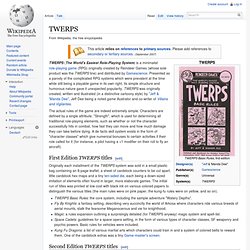
Presented as a parody of the complicated RPG systems which were prevalent at the time while still being a playable game in its own right, its simple structure and humorous nature gave it unexpected popularity. TWERPS was originally created, written and illustrated (in a distinctive cartoony style) by "Jeff & 'Manda Dee", Jeff Dee being a noted game illustrator and co-writer of Villains and Vigilantes. The actual rules of the game are indeed extremely simple.
Characters are defined by a single attribute, "Strength", which is used for determining all traditional role-playing elements, such as whether or not the character successfully hits in combat, how fast they can move and how much damage they can take before dying. Turning Passion Into Great Games! Fate (role-playing game system) Fate is a generic role-playing game system based on the FUDGE gaming system.
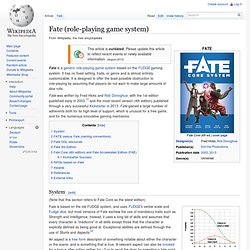
It has no fixed setting, traits, or genre and is almost entirely customizable. It is designed to offer the least possible obstruction to role-playing by assuming that players do not want to make large amounts of dice rolls. Fate was written by Fred Hicks and Rob Donoghue, with the 1st edition published early in 2003,[1] and the most recent version (4th edition) published through a very successful Kickstarter in 2013. Fate gained a large number of adherents both for its high level of support, which is unusual for a free game, and for the numerous innovative gaming mechanics. (Note that this section refers to Fate Core as the latest edition) Probability of results in the FATE system An aspect is a free form descriptor of something notable about either the character or the scene, and is something that is true.
The 3rd edition of Fate was no longer a generic RPG like the first two versions, but set in the pulp genre. Fate.